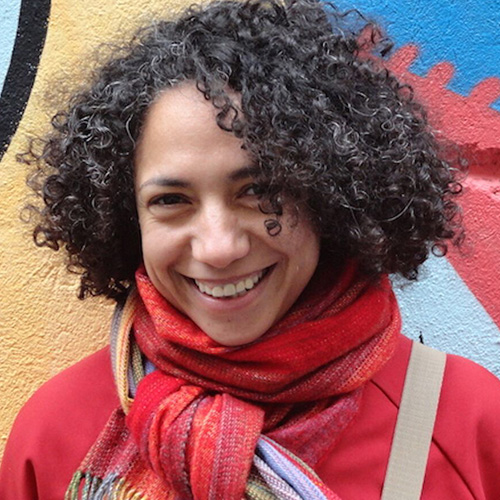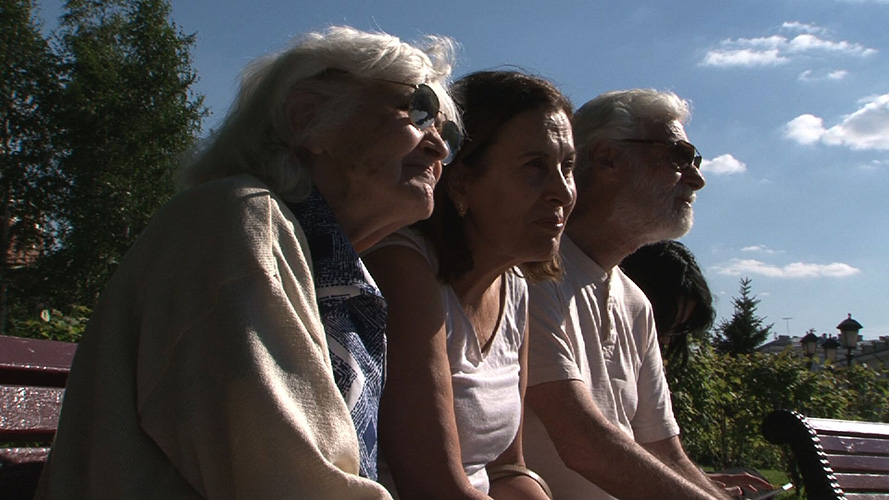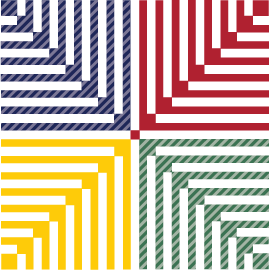

You Come From Far Away chronicles the family story of Palestinian Najati Sidqi, who fought against fascism in the Spanish Civil War, only to be expelled and barred from returning to Palestine in the wake of World War II and the establishment of Israel in 1948. Forced to split his family up and unable to repatriate his daughter Dawlat, who is separated from the family by thousands of miles and vastly different cultures, the film details the family’s struggle to reunite and explores the complicated issues related to identity among Palestinian refugees. We spoke with filmmaker Amal Ramsis ahead of Sunday’s screening of You Come From Far Away.


BPFF: How did you get into film and decide to make You Come From Far Away?
AR: I am an Egyptian filmmaker. I studied law many years ago, and later I became attached to cinema and wanted to study it. In 2002, I went to Spain and I started to study cinema in a film school there. In 2003, the US invaded Iraq, and in Madrid, where I was living, there were big demonstrations against the invasion. Just after, I read an article about Arabs who fought against Franco in the Spanish Civil War. Until then, almost no one knew about these Arabs. Everyone knew about Moroccans whom Franco brought to Spain [to fight] against the Republicans. So, this article was very strange from my point of view and something very new.
I contacted the writer. He was 85. By coincidence, while looking in the archives and studying the Chinese role in the Spanish Civil War, he found the names of many Arabs who came to Spain with falsified French passports [which was dangerous for them, because] in that period, North of Africa was colonized by the French and Spanish. So when he contacted me, he told me, “You are the only one who’s interested in this subject,” and he gave me his entire archive and all of his material.
Then I started my research. I had an idea about a film about Arabs in the Spanish Civil War—just to say that there is another phase of the history; there is another unknown side. But I knew that my film was not yet the film I had been thinking about in 2003.
When I started researching in 2003, I got to know Spanish activists who went to Iraq in solidarity with the Iraqi people, and they knew about one Arab who went to Spain in solidarity with them during the Spanish Civil War. They named their group after him, Mohamed Bilaidi.[1] And they helped me also with research. But I wanted to understand the historical context for the film and also to understand why there were Arabs who felt such commitment to the Spanish Civil War as had others: Germans, Americans, Chinese, and so on.
During the four years that it took me to complete my research, I was looking for a personal story. I knew that around 1000 Arabs [fought for the Republicans], but for me, they were just names. I didn’t want to make the classic film, this kind of National Geographic [documentary]. I was more interested in the story of people who participated. I didn’t expect to find any of them, because in 2005, in 2007, very few Republicans were still alive. I was looking for maybe the second generation or the third generation of some who had participated in the Spanish Civil War.
In 2007, I was still living in Madrid. By coincidence, I read a book about Arab travelers around the world, and one chapter was about Najati Sidqi. But in the book, he was just a traveler; they didn’t put him in the political context of the story or the Spanish Civil War. I contacted the author, and she told me that she translated the chapter and that it’s part of the memoirs of Najati Sidqi, which was published in Beirut. She said he has a daughter in Athens and maybe she could send me the book.
I contacted the daughter, Hind, and she sent me the book. When I read it, I felt, yes, finally I read something written by one of them [Arabs who served on Republican side], not about them. And there is a daughter! Two months later, I decided to go Athens to meet Hind.
When I went to Athens, I did not know anything about that family’s personal story, because the book was only a political book about the history of the Communist party in Palestine before 1948 and during the 1930s, and about how they were thinking about the Spanish Civil War and how he went to Spain, and his trip. He didn’t mention his personal story. He didn’t even mention that he has a daughter in Moscow or anything about his wife.
When I was with Hind, I was actually talking about politics, and I didn’t expect anything else! Suddenly she told me, “I have a sister in Moscow, we don’t speak the same language. She speaks Russian, I speak Arabic.” I asked, “So you don’t have the same father?” She told me “Najati Sidqi is our father!” Later I said, “OK, so you don’t have the same mother?” She said “No. No, we have the same mother!” So I thought, here there is something!
Then she told me the whole story of the family, which was incredible and multilayered. It made this kind of twist or turning point in the film. Then I decided, now I have a real, strong story to film, and let’s film with Dawlat. This was in 2007, and no one was interested in the Spanish Civil War, let alone Arabs in the Spanish Civil War, so I didn’t get funding. Later, I went back to Egypt, and it was at the time of the Revolution. I made two films on the Revolution during this period. When it became clear that the revolution was not an “Arab” Spring but rather a real “Wintry” Spring, I returned to the old idea of the film that I wanted to make one day.
Suddenly in 2015, Hind and called and told me that if I’m still interested, I should go immediately to Moscow because Dawlat is very old and she has started to lose her memory. There is no film, of course, without Dawlat. Then I went to Moscow with my camera and with my husband without any kind of production assistance. My husband filmed with me, and we went in 2015 to meet Dawlat for the first time.
We discovered a very, very personable character who knew history. She had a very strong memory, even stronger than that of her younger sister who lives in Athens. Dawlat was an amazing person. She took the film to another to another place, you know with her story—not only her story, but her perspective on history.
Dawlat doesn’t see herself as a victim. This is very important in her character, and I tried to reflect it in the film. There are people who make a decision, who choose, that even if they are defeated they will not be not victims. She’s a strong woman, and she forgives without talking about forgiveness. She really understands what happened, and she feels that it was important. If history were to repeat itself, their parents should take the same decision, and she’s ready to pay this price. So, in a way, she took this film to another place, not only talking about history. It’s also reflecting how people change history and also how history changes their lives. But it’s a dialectic relationship. It’s not only that there are big events and we are the victims; there is this interaction between our lives and history and it’s the free choice of everyone [as to which interpretation they live by].
When we filmed her in 2015, I took the footage and I edited almost half of the film without knowing if I can manage to finish it. I continued looking for funding, and I thought if I find the resources, I will arrange a reunion between the three siblings, Saeed, Hind, and Dawlat in Beirut, because they met for the first time in Beirut.
During these two years when we found the money, we knew that Dawlat had had a stroke and she was unable to make this trip to Beirut emotionally or physically. Then we thought, maybe it’s better to hold it in Moscow. So we brought Saeed from Brazil and Hind from Athens and we finished the film.
BPFF: This film must have been very emotional to take on and complete. Is that how you saw it?
AR: Yes. I think that everything should be emotionally strong. If you make a documentary, you make it because the subject touched you a lot. In and of itself, making documentaries is a choice to be involved in people’s lives. Being involved means meeting people who have amazing stories, and you should know how to deal with it. In our film it was even more, because we were trying to tell a story that even many members of the family didn’t know. When we met in Moscow, we collected a lot of stories that the others didn’t know. It was something unique.
In a way, I was the only one who knew the whole story. My role is to rebuild this story while respecting all of the family’s pain and the secrets. I don’t have the right just to invade because I know more than them. It’s not only rebuilding the personal story; it was also rebuilding this story in relation to the bigger story of our recent years. So it was emotionally very difficult.
For me, the editing period was the most difficult, because I did it by myself and I felt strongly that I had to be honest with them and not sensationalize their story. I had to be honest even with myself and with the story and what I’m thinking about history.
BPFF: In the film, you examine throughout the idea of identity and the concept of home. Can you talk more about the idea of identity?
AR: You discovered that the home for everyone is totally different. The home for Saeed is not the home for Dawlat. Saeed left the family when he was 24 years old. He went to the US and later to Brazil, and it was his choice just to launch a new life far from all of this tragedy. He said he feels that he doesn’t belong; belonging is something strange for him. In a different way, Dawlat belongs. Dawlat, who didn’t live in Palestine—she belongs more. I felt like there’s no one version of “home—about the place we belong, about identity .
I learned from the film that everyone has his or her own home or own concept of “home. “But also I learned that from the film protagonists’ granddaughters and grandsons, who live in Toronto, Dubai, Brazil, even in Moscow. Their concepts of home depend on where they lived. This is what I learned from the film, and I tried to reflect it in the film.
BPFF: Talking about Najati and just the idea of the Palestinian diaspora: Throughout the film, it seems as if there is never a time when the family can gather everyone together. There’s always something around the corner. Does this mirror the experience of those in the Palestinian diaspora and refugees in general?
AR: I’m Egyptian. I live in Cairo. Cairo is about around, 300 kilometers from Gaza, and we cannot go to Gaza. It’s as if we are in jail. The people in Gaza of course are in a bigger jail, and they cannot leave. And the people in Gaza by the way, many of them thousands of them are refugees because Gaza was not their original home [because they were expelled during the Nakba].
So yes, I’m Egyptian, but I live in the Arab world, and I’m very familiar with these stories of Palestinians who are in the Diaspora. Almost all of my Palestinian friends are in the diaspora. I have very few friends who still live In Palestine, and I know them through social media because they cannot leave. I have some friends in Gaza, but I’ve never met them. I’m so familiar with these stories, with the Palestinian diaspora, with all of this pain—and losing memories and trying to keep a memory about something, about the key of your grandmother’s house.
Actually, our story in Egypt is so affected by the Palestinian diaspora, by the Israeli occupation. It’s like it’s the same story. Okay, maybe I didn’t experience in my family something like that. But all of my history, all of my daily life, is affected by this occupation, which is very near. The Israeli occupation is not only in in a certain land; the plan of Israel is to be everywhere. These kinds of economic and political agreements, affect us every day. I don’t come from far away, from India. It’s our story, and the diaspora is not only something you read in books, right? It’s part of our heritage and our daily life.
BPFF: You Come From Far Away is a film about Palestine, but it doesn’t really take place in Palestine. It takes place in Moscow, Athens, Beirut, Paris, and Spain.
AR: It’s a Palestinian story, but with no land. I think this is a metaphor for the film. Where’s Palestine? For example, even when Dawlat died, she wanted to be buried in Palestine. But of course Hind cannot enter Palestine, nor can Saeed, because they were not born there. And if you’re born there, you cannot go back. Maybe the granddaughter [could travel there], but it was, for her, something very difficult emotionally to go back with the ashes of her grandmother. You can talk about Palestine everywhere, in Moscow and Brazil and Lebanon. Palestinians brought their stories all over the world! You can find Palestine everywhere, you know. But the only place they want to be is occupied.
BPFF: In the film, you talked about the war in Iraq, and the relation with the Spanish activists who went to show solidarity with Iraqi civilians. There is a woman who is speaking Spanish. Who is that person?
AR: It’s me! The language in the film was also another subject. All of my research about the Spanish Civil War was in Spanish. I speak Spanish very well. And the siblings speak different languages. They are Palestinians, but one speaks Russian, another speaks Portuguese, and others speak Greek. I also didn’t want to make the film in Egyptian dialect, which is what I use; that would be strange. I could speak in Palestinian dialect, because it would sound forced. The other solution was going to be classical Arabic, but that is the language of reading and writing, not sharing emotions. When I decided to use Spanish, for me, it was a [great way to connect with those other languages , because that the story started in a way during the Spanish Civil War.
BPFF: Did you feel a burden as a filmmaker to present these stories that hadn’t been previously told?
AR: I felt this about the role of Arabs in the Spanish Civil War. Because I wanted to talk about another political moment in the Arab world, where the dream was also to change the world and end occupation, end colonialism—and this dream, part of it was fighting Fascism and standing in solidarity with other people in other countries. This unknown story, I felt the pressure to tell it, because it reflects another narrative about Arabs. Because all the time when [the media] talks about Arabs, they are either immigrants or terrorists. I said no, I’m not a terrorist or an immigrant; I have another story. Also, when you talk about Europe and the Arab world, the image that comes to mind is waves of immigrants trying to arrive to Europe as a place of freedom. I wanted to convey that in Europe, there was Fascism, and we were very aware about the danger of this Fascism and we also tried to fight it in Europe, not only to go there as immigrants. So, this is seeing history from another perspective, and this was the kind of pressure I felt when I researched these Arabs in the Spanish Civil War. It reflects a political moment, and it gives you an idea how we write the history and why we’ve never heard about these 1000 people who went to Spain. Also, it’s politics, because we know about Germans, Italians, Americans—but we didn’t know anything about Arabs, and there were a lot of them. So it’s another way to write the history. From my point of view, I wanted to tell the story and to say that there is another perspective.
This was the initial idea, but when I went through the archives and all the personal stories of the film, I felt something more on perspectives about history. These archives are very expensive, and most people and filmmakers don’t have access to this kind of archive. So in a way, history is in jail! If they made it a little cheaper, more people would use it. I think it’s a political issue, because they don’t want us to see, for example, the images from Palestine in the 1930s, which I use in my film. These images reflect that there was a real, very modern country before Israel was established. It’s not “a land without people” as Israel claims. It’s totally different. But the archive is inaccessible for many people.
In my film, I tried to give oral history the same weight as the archive. If the archive won’t give me footage, but I have the memory, the imagination, and I have the people who narrate their lived experience, so I can use some other image for something that I don’t have. So in a way, it’s reconstructing the archive and our memory in a different way.
BPFF: Thank you so much. We look forward to screening your film and having you in conversation at the festival!
[1] Mohamed Bilaidi was a Moroccan volunteer airman in the Spanish Republican Air Force who was killed in combat in 1936 in the Spanish Civil War.
You Come From Far Away screens Sunday, October 20, 2019 at 4 pm at the Museum of Fine Arts, Boston. Amal Ramsis will be in conversation following the film.
View the full festival schedule and buy tickets here.

